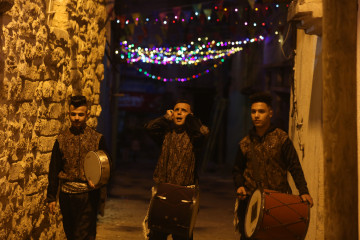

For the first time in a long time, the besieged coastal enclave has been decorated with coloured lights and huge lanterns to welcome the Islamic holy month of Ramadan, which began on Thursday.
Streets and markets, as well as big malls, are overcrowded in Gaza with locals who have flocked down to buy food, decorations, lanterns, and sweets to prepare for suhoor and iftar.
Anyone walking the streets can notice the happiness on the locals' faces who exchange congratulations for Ramadan, while children rush towards the coloured huge figures of the crescent moon to take photos in front of them.
"We have really missed this joyful atmosphere. We are in need of these moments of happiness, even if they are short-lived"
For long years, locals in the war-torn impoverished coastal enclave were deprived of celebrating the month of Ramadan because of the Israeli wars, Reem al-Naji, a Gaza-based local woman told The New Arab.
“We have really missed this joyful atmosphere. We are in need of these moments of happiness, even if they are short-lived,” the 42-year-old mother of four told The New Arab.
To make her kids happier, Reem took them to various markets over several days to buy their decorations and food for Ramadan. She said, “although the prices of goods are very expensive, it does not matter as long as I get to see the smile on my children's faces."
Marwa Salama, a middle-aged woman from the city of Khan Younis in the south of Gaza, has found her way to the public market in her area after years of not going there.
“Neither me or my children could afford the decorations for Ramadan for many years years. But the situation has changed since my bigger son is now employed in the government,” the 52-year-old tells The New Arab with a smile on her face.
“I was pleasantly surprised and very happy to see so many people out in the markets buying goods and in a celebratory mood,” she added as she paid money to a merchant of lanterns.
Throughout the period of preparations for Ramadan, the signs of satisfaction seemed clear to the local merchants, who praised the high percentage of sales, something that was not seen in previous years.
“It seems that the people were longing for the joy that they missed so much because of the repeated Israeli wars on the Strip,” Salim al-Dayya, a merchant of decorations and lanterns, told The New Arab.
He added, “although I was afraid of incurring financial losses, I am very happy that I have sold more than 95 percent of the goods that have been stockpiled for years.”
In a bid to spread joy among his neighbours, Mohammed al-Saedi, a resident of Gaza city, decided to take matters into his own hands by painting the outdoor walls of his house as well as 50 others in his neighbourhood in beautiful colours.
“I launched my individual initiative of painting the walls of the houses with bright shades and drawing pictures of Ramadan lanterns to make the children happy, in an attempt to change the images of destruction lingering in their minds,” the 54-year-old told The New Arab.
In fact, he says, the new generation of Gazan children have been prevented from experiencing the real rituals of Ramadan.
For this, he explains, “I hope that each old person can bear his responsibilities towards his community and the children to enhance their concepts of religious celebrations by implementing initiatives, even if they are individual, that contribute to spreading their community cohesion.”
However, Palestinians are fearful of the outbreak of war with the Israeli occupation during the month of Ramadan, in light of the escalation of statements and messages exchanged between the Palestinian resistance factions and the occupying state.
Tayseer Muheisen, a Gaza-based political analyst, believes that the recent statements of Marwan Issa, a major general of al-Qassam Brigades, the armed wing of Hamas, bore indications that the atmosphere may change and that there may be a confrontation imposed on the Palestinians during the month of Ramadan.
According to Muheisen, the prisoners' possible strike at the beginning of Ramadan is considered one of the hot issues that may necessitate, in the event of a clash between the prisoners and the prison administration, the intervention of the resistance in the Strip.
He points out that what happened in the confrontation with the "Saif al-Quds" in 2021 may happen in a broader, more comprehensive, and deeper way. This waspresent in the messages of the Qassam commander, specifically in regards to the Al-Aqsa and the prisoners' files.
Muheisen believes that what will decide the scene regarding the possibility of a confrontation erupting or not during the coming period is the state of disparity within the government of Benjamin Netanyahu and his ability to control the rhythm of the political scene in it.







 Follow the Middle East's top stories in English at The New Arab on Google News
Follow the Middle East's top stories in English at The New Arab on Google News


